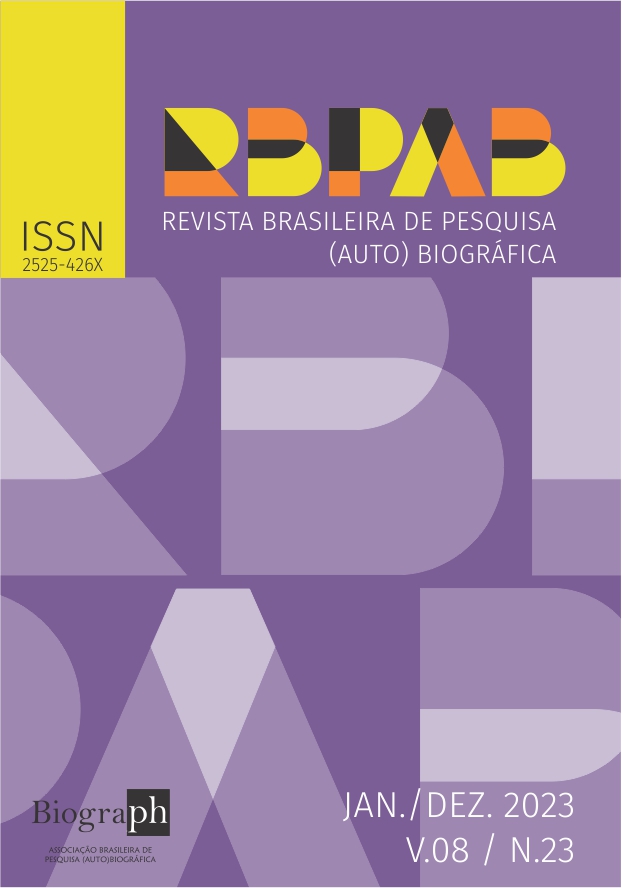The identical “i” of Lepê Correia and the art of drawing yourself
DOI:
https://doi.org/10.31892/rbpab2525-426X.2023.v8.n23.e1135Keywords:
: Identical “I”,, (Auto)biographical research, Self-mediality, Drawing,, Education.Abstract
This article is the result of one of the chapters of a thesis of an (auto)biographical and aims to demonstrate how art can relate to narrative in construction of a self-writing, in the space of drawing, storytelling and photography, reeducating the look of the individual who draws himself, rebuilding his history. Like this, placing my body as an essential part of my experience, I expand the relationship of the my “I” Identical with other “I’s”, mediated by the ways that I trace, that I narrate and drawing, giving meaning to the stories of my life and those who meet me, as in which the images perform the composition of what I become, while (self) biographed, aiming to strengthen our identities. Pencil drawings, India ink and ballpoint pen and wax pencil, oil canvases, and a photographic image, make up this work that has “Nego Zau” as its background, a short story, which works as a space-mat where the plot of the article develops in dialogue with the text of the researcher De Oliveira (2021), on the work of professor Delory Momberger, that makes art dialogue with the (auto)biographical process, through its concept of Automedialidad, which uses the space element as a foundation for the (self)biography.
Downloads
References
BENISTE, José. Jogo de Búzios: o encontro com o desconhecido. Rio de Janeiro: Bertrand Brasil, 2020.
BOURDIEU, Pierre. Esboço para uma auto-análise. Lisboa: Edições 70, 2005.
CORREIA, Lepê. “Nego Zau”. In: RIBEIRO, Esmeralda. Cadernos Negros 38: contos afro-brasileiros. São Paulo: Quilombhoje, 2015. p. 15-18.
CORREIA, Severino do Ramo. A educação enquanto palco (auto)biográfico: o “eu” idêntico de Lepê Correia. 2023. 252f. Tese (Doutorado em Educação) – Programa de Pós-graduação em Educação, Universidade Federal de Pernambuco, Recife, 2023.
DELORY-MOMBERGER, Christine. Biografia e Educação: figuras do indivíduo-projeto. Natal-RN: EDUFRN, 2014.
DE OLIVEIRA, G. C. Poéticas da memória. Christine Delory-Momberger e fotografia. Revista Brasileira de Pesquisa (Auto)biográfica, Salvador, v. 6, n. 17, p. 224–234, 2021. DOI: 10.31892/rbpab2525-426X.2021.v6.n17.p224-234. Disponível em: https://www.revistas.uneb.br/index.php/rbpab/article/view/9107. Acesso em: 29 mar. 2023.
FONSECA JUNIOR, Eduardo. Dicionário Yorubá (Nagô) Português. Rio de Janeiro: Ed. Civilização Brasileira, 1988.
HAMPÂTÉ BÂ, Amadou. “A Tradição Viva”. In: KI_ZERBO, Joseph. História Geral da África: Metodologia e Pré-História da África. São Paulo: Ed. Cortez; Brasília: UNESCO, 2011. p. 167-212.
PASSEGGI, Maria da Conceição & SILVA, Vivian, Batista da (Org). Invenções de Vida, Compreensão de Itinerários e Alternativas de formação. São Paulo: Cultura Acadêmica, 2010.
PASSEGGI, Maria da Conceição & ABRAHÃO, Maria Helena Mena Barreto (Org). Dimensões Epistemológicas e Metodológicas da Pesquisa (Auto)biográfica. Tomo II, Natal: EDUFRN; Porto Alegre: EDIPUCRS5; Salvador: EDUNER, 2012.
SANTOS, Juana Elbein dos. Os nagô e a morte: Pade, Asèsè e o culto Egun na Bahia. Petrópolis: Vozes, 1986.
SEPHARIAL. Manual de Ocultismo. Rio De Janeiro: Francisco Alves, 1984.
SOUZA, Edilson Fernandes de. À Luz do Candeeiro e o Constructo do “Eu” Fonte: Educação pela Arte, Ciência e Política. Tese promoção ao cargo de Professor Titular da UFPE (Centro de Ciências da Saúde), Recife, 2020.
SOUZA, Elizeu Clementino de. O Conhecimento de si: estágios e narrativas de formação de professores, Rio de Janeiro: DP&A; Salvador, BA:UNEB, 2006.
WEIS-BOMFIM, Patrícia. Lepê Correia. DUARTE, Eduardo de Assis (Org). Literatura e afrodescendência no Brasil: antologia crítica. Vol. 3, Belo Horizonte: Editora UFMG, 2011. p. 135-144.













































